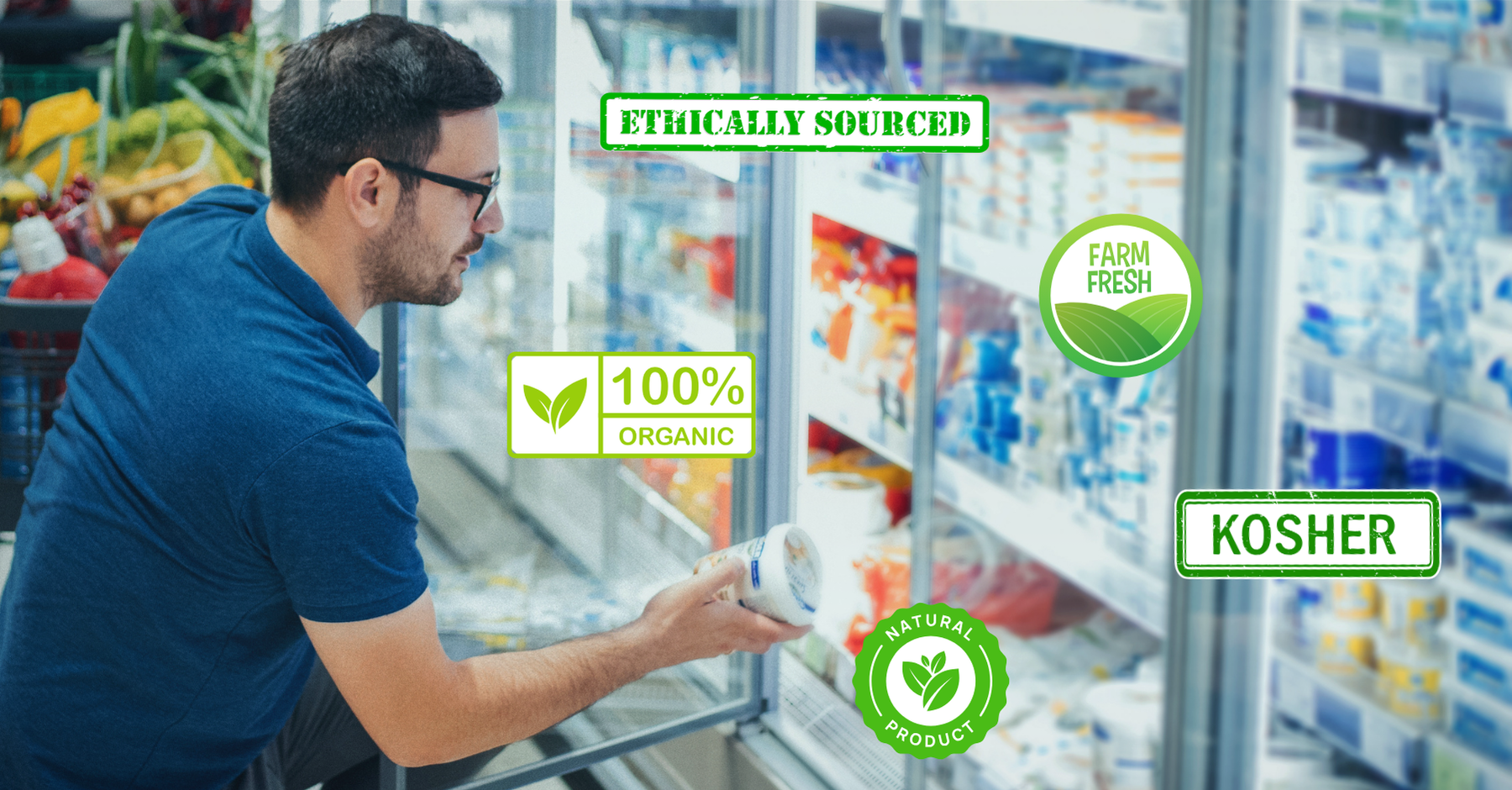What Is Kosher Humanewashing?
You may have heard of greenwashing, when companies and brands make their products seem more environmentally friendly than they really are. Humanewashing is a similar tactic, but it focuses on claims about animal welfare rather than the environment. Like the rest of conventional products, marketing claims on kosher certified food products can mislead well-intentioned consumers into purchasing items they believe were produced on farms that treat animals more humanely. We call this phenomenon kosher humanewashing.
An Introduction to Humanewashing
Humanewashing is the discrepancy between what is depicted on food labels and what actually happens behind the scenes in the food and farming industries.
Farm Forward describes humanewashing as:
“Efforts to market animal products to conscientious consumers through deceptive packaging and labeling, promoting the illusion of animal well-being while concealing the extent of animals’ illness and suffering.”
Humanewashing tactics can range from pastoral imagery on packaging (red barns, happy animals, grassy fields) to misleading labels like “humanely raised,” “free-range,” or “raised without antibiotics.” Even third-party animal welfare-related certifications perpetuate these practices, especially when they’re deeply tied to the meat industry.
In other words, it’s a way to sell factory-farmed dairy, fish, beef, and poultry to people who care about animal well-being, without ensuring that the underlying practices are actually better for the animals.
Understanding Kosher Humanewashing
Kosher vs Kosher Certifications
Kashrut, ancient Jewish dietary laws, have provided a framework for Jewish communities to determine what foods are kosher, or “fit to eat,” and how to slaughter animals according to approved religious procedures. But modern kosher food production has changed dramatically over the past few decades.
Industrial agriculture and food production are driven by speed, profit, and efficiency, and became mainstream in the United States by the second half of the 20th century. Kosher production similarly got swept up in the entrenchment of industrialization along with the rest of the food industry.
Commercial kosher certifications—which are not the same as historical communal or household practices of keeping kosher—have largely been shaped by and adapted to the realities of industrialization. This shift marked a move away from kosher as a set of community-rooted, relational food ethics toward a system governed by third-party supervision and industrial compatibility. In this system, what counts as “kosher” often reflects technical compliance with slaughter procedures more than moral or spiritual intent.
The Reputation of Kosher Certifications
When buyers look for a kosher certification, they likely aren’t equating the food behind the label with pollution, worker exploitation, pandemic outbreak risk, and mass animal suffering—the hallmark features of industrial animal agriculture. However, virtually all kosher-certified animal products found in grocery stores in the US today come from animals raised in the exact same factory farm conditions as animals raised for non-kosher poultry, fish, milk, and beef products.
This is because kosher certifiers aren’t responsible for setting standards around sustainability, worker treatment, or production methods like how animals are raised or if they had access to the outdoors. While some large kosher production companies could set better standards in their operations, their certifications do not rely on them. Therefore, certifications only regulate specific aspects of kosher slaughter and lack purview over an animal’s shortened life before the moment they are killed.
Despite this limited oversight, kosher-certified food products have a reputation as being higher quality and better for animals. Research shows that most shoppers, Jewish and non-Jewish, believe kosher certifications indicate that farmed animals are bred and raised differently from conventional methods. This disconnect between consumer perception and reality is the result of kosher humanewashing.
In 2004, an undercover investigation by PETA rocked the kosher industry to its core, revealing horrifying scenes of animal abuse inside Agriprocessors—then the largest kosher operation in the United States. The footage, which showed animals writhing in agony and being brutally mistreated, sent shockwaves through both the Jewish and animal welfare communities. Despite public outcry, the Orthodox Union, America’s leading kosher certifier, replied with a stunning defense, calling the footage “testimony that this is being done right” and did not show violations of kosher law.
The investigation shattered assumptions about the ethical integrity of kosher meat production and ignited a nationwide reckoning over what it truly means for food to be “kosher.” Yet little has changed since this investigation, underscoring how deeply entrenched kosher humanewashing has become.
Kosher certifying agencies are well aware of the brutal, routine practices that define the industrial animal agriculture industry. In spite of this, Jewish and non-Jewish consumers alike are deceived by kosher humanewashing practices into believing they are making a more humane choice, when in reality they are unwittingly supporting the same cruel factory farming system behind most non-kosher food production.
Beyond the Label
Kashrut is meant to guide our food choices according to Jewish law and wisdom. But in a time of industrial farming and pervasive, deceptive marketing, we must ask a deeper question: Do the foods we buy and serve align with our ethical teachings?
As Rabbi Geoffrey Claussen wrote:
“It is time for Jewish communities to ensure that kosher-certified food products actually reflect our values—and to limit our consumption of food produced in conditions of significant suffering and exploitation.”
Reckoning with kosher humanewashing means reevaluating what we consider kosher beyond the narrow scope of kosher certifiers and other third-party certifications. It also calls us to shift the foods we buy and serve in community in order to better align our food culture with core Jewish values.
In 2022, the Center for Jewish Food Ethics (previously as Jewish Initiative for Animals) organized over 250 Jewish leaders to speak out against kosher humanewashing and call on communities to change their practices. These leaders acknowledged the disconnect between Jewish ethics and the suffering that persists in kosher-certified animal agriculture, urging fellow leaders and organizations to build a more just and compassionate food system by reducing animal product consumption and serving plant-based meals by default.
Individuals and communities can combat kosher humanewashing by:
Reducing your reliance on sourcing animal products produced on factory farms, whether they’re kosher-certified or not.
Incorporating more plant-forward meals into our homes, institutions, and communal events. Eating plant-based foods minimizes animal suffering and better reflects the Jewish values of compassion and justice.
Reevaluating assumptions about kosher certification, and educating our communities on what these labels do—and don’t—mean.
Watching and sharing “Shalom Begins on Your Plate,” which features six prominent rabbis speaking to the importance of aligning our food practices with Jewish values.
Encouraging Jewish clergy to sign onto CJFE’s Clergy Statement to encourage Jewish communities to transition toward plant-based food practices.
Creating an ethical food policy for your Jewish organization or institution with support from ideation to implementation by CJFE.
Together, we can create a more just and compassionate food system that does good for people, animals, and our planet.
Contact us to schedule a free food policy for your Jewish institution, congregation, or community.


